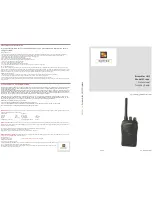
– 38 –
•
Radio communication systems are subject to external interference, natural or man-made, intentional or
coincidental, that may keep a signal or group of signals from being successfully received by a master
receiving station or a central station. In addition, one-way radio communication devices receive no
acknowledgment from a master receiving station that their signals are being successfully received.
Signals transmitted may clash with those transmitted from other systems. While statistical estimates
predict successful operation, if the guidelines in the system manuals are followed, the operation of this
system is still probabilistic in nature and may be subject to random signal failures.
•
Radio communication devices may change their characteristics over time. Such parameters as frequency,
modulation and power should be properly monitored periodically, with required adjustments made by
qualified personnel.
•
Radio communication devices must be installed by qualified personnel. Improper installation or selection
of a transmitter’s location may cause intermittent or unreliable performance.
Any electronic or mechanical device can fail. The most common cause of an alarm system or a radio
communications system not functioning properly when an intrusion or fire occurs is inadequate
maintenance, maintenance that is intended to find such failures as soon as possible. This alarm and
communication system should be tested weekly to be sure all sensors and transmitters are working properly.
Installing an alarm system may make one eligible for lower insurance rates, but an alarm system is not a
substitute for adequate insurance. Homeowners, property owners, business owners and renters should
continue to insure their property and lives.


































